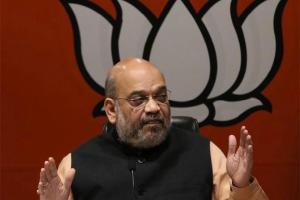According to the constitution, Article 370 is a "temporary provision" which promises to grant autonomous status to the state of Jammu and Kashmir

Amit Shah handled the proceedings in the Parliament. Pic/ AFP
The Union government moved a resolution in the Rajya Sabha on Monday to revoke Article 370 amid uproarious protests from opposition benches. The resolution was moved by Amit Shah, the Union home minister in the backdrop of growing tension in the state of Jammu and Kashmir. The government also decided to bifurcate the state into two Union territories – Jammu and Kashmir and Ladakh
ADVERTISEMENT
What is Article 370 of the Constitution
Article 370 is a 'temporary provision' that grants special power to the state of Jammu and Kashmir and limits Parliament’s powers to make laws for the state. Under Part XXI of the Constitution titled "Temporary, transitional and special provisions", this article is categorised as a "temporary provision with respect to the State of Jammu and Kashmir".
Article 370 limits Parliament’s powers to make laws to those matters in the Union and Concurrent Lists, in consultation with the state government, which should correspond with matters specified under of Instrument of Accession, the statute states. The state of Jammu and Kashmir Assembly currently stands dissolved.
In effect, Article 370 states that Parliament will need the state government’s concurrence for applying any law, except those that fall in the domains of foreign affairs, defence, finance and communications. Issues like fundamental rights, ownership of property and citizenship are covered under a separate law for Jammu and Kashmir.
The Article also lays down that only two Articles of the Constitution will apply to the state of Jammu and Kashmir – Article 1 that defines India and Article 370 itself and the provision was included in the Constitution on October 17, 1949.
Also Read: Amit Shah: Article 370 doesn't link Kashmir with India
The ruling Bharatiya Janata Party (BJP), in the run-up to the 2019 national elections had reiterated its commitment to the abrogation of Article 370. Amid protests in the Rajya Sabha by opposition parties, the move saw BJP leaders welcoming it. “What a glorious day. Finally, the martyrdom of thousands starting with Dr Shyama Prasad Mukherjee for complete integration of J&K into Indian Union is being honoured and d seven-decade-old demand of d entire nation being realised in front of our eyes; in our lifetime. Ever imagined?" BJP national general secretary Ram Madhav tweeted.
"In the last five years, we have made all necessary efforts to ensure peace in Jammu and Kashmir through decisive actions and firm policy. We are committed to overcoming all obstacles that come in the way of development and providing adequate financial resources to all the regions of the state. We reiterate our position since the time of the Jan Sangh to the abrogation of Article 370," the BJP manifesto read.
Also Read: Twitterati reacts to Amit Shah's proposition to revoke Article 370
Catch up on all the latest Crime, National, International and Hatke news here. Also download the new mid-day Android and iOS apps to get latest updates
 Subscribe today by clicking the link and stay updated with the latest news!" Click here!
Subscribe today by clicking the link and stay updated with the latest news!" Click here!






